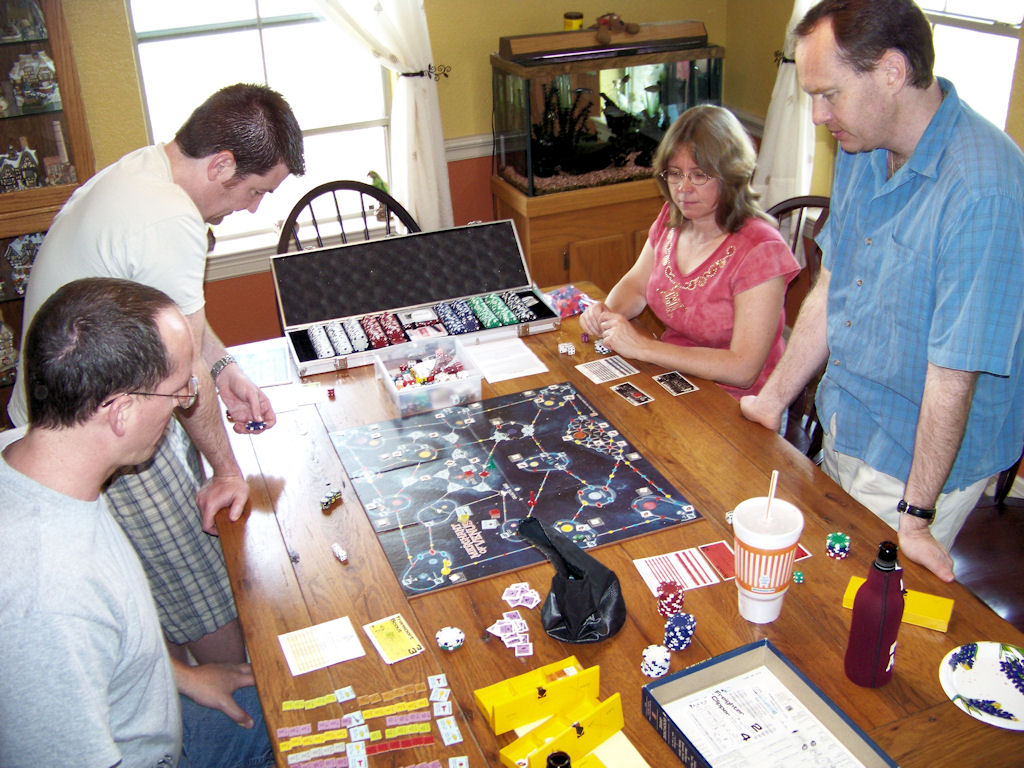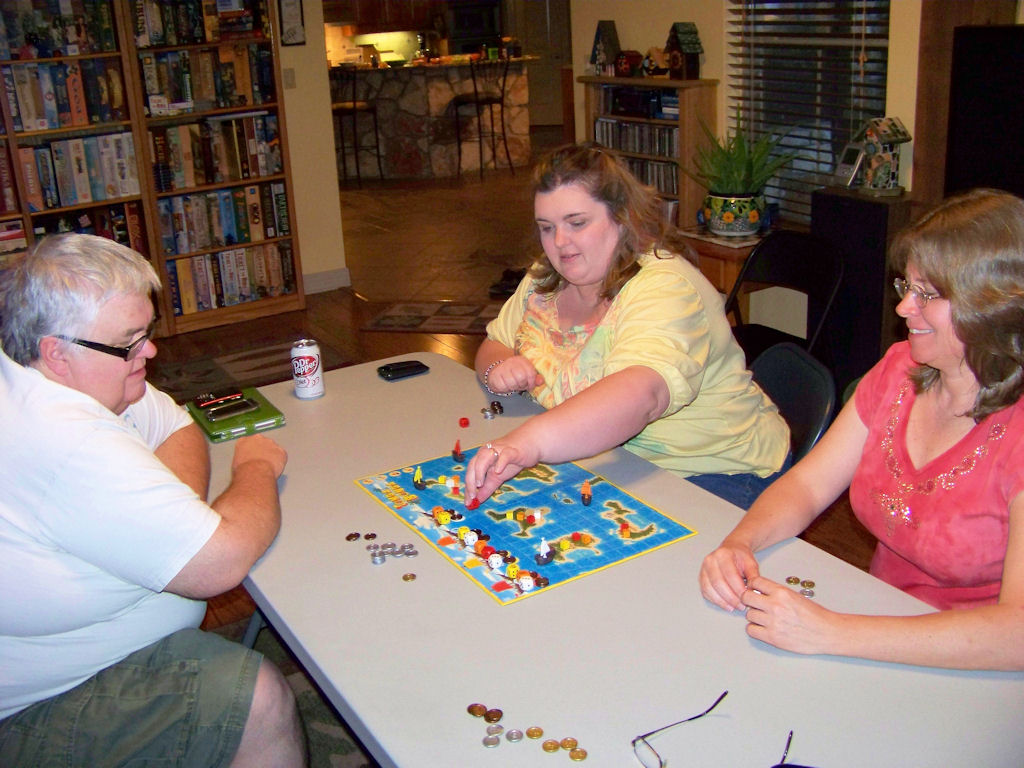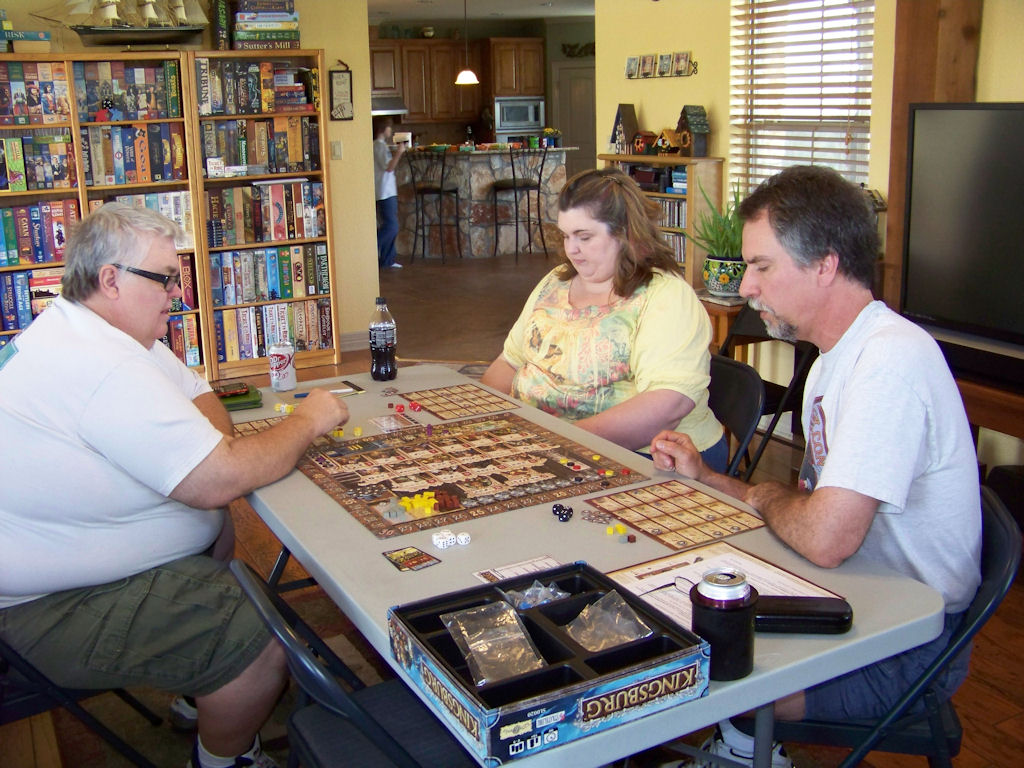
April 1, 2009Oldies that definitely aren't moldyby Susan RozmiarekToday was a day of golden oldies in which I discovered an old gem that definitely reinforces the idea that one should not judge a game by its box. And I mean a box with really, REALLY hideous art, the kind drawn by a nerdy teenager. The fact that the game is an old Avalon Hill game with handfuls of little chits (confetti - whee!) and those typically awful black and white rules with a tiny font and numbered sections should not be a deterrent either. Well, not in this case, anyway. The game that I'm talking about is Merchant of Venus and after only one play, I'm totally smitten. My cult-of-the-new-Eurogame-only group has been strangely enamored with this game lately and I'd successfully avoided it until today. It came out in the late '80s, a time when I only lurked on the fringes of gaming and there had to be a dragon or wizard on the box for me to notice a game. The ones I did try, like Dragonhunt and Wizard's Quest, were disappointments at the time that kept me on the fringe. I assumed that Merchant of Venus was some sort of science fiction wargame and I wasn't going to go near something like that. I guess "Merchant" should have been a clue. So, when I was told it was a pick-up-and-deliver game, my protective shields started to crack a little. I ADORE that sort of game. That is exactly what Merchant of Venus turned out to be, with the added fun of an exploration game. Empire Builder (EB) is a good game to compare with Merchant of Venus (MoV) as both games scratch the same itch for me and share many similarities but are also quite different. EB is played on a fixed map and you will always know where each type of good will be found. The random factor is in drawing the Demand Cards that will tell what good needs to be shipped to what location. In MoV, it is the opposite. Each culture produces certain goods, but you will not know at the start where the various cultures are located. The cultures that demand a certain type of good will always be the same but, once again, you will not know where they are located until they have been by exploring the planet locations on the board. Similar to the Empire Builder games, you can upgrade your ship to either be fast or you can choose to sacrifice speed in favor of more cargo space. In EB, the number of spaces you can move on a turn is fixed, depending on the type of engine. In MoV, movement is determined by dice roll, with your ship's speed determining the number of dice you roll. The goal of both games is to be the first to earn a certain amount of money by picking up and delivering goods. You do spend your earnings in MoV to build things like factories and spaceports, which earn you commissions when other players use them, but their values also count as part of your earnings. However, you actually spend your earnings in EB to build your network of track so you have to carefully monitor your income or you may find yourself in the bad position of having no money and no way to earn more. This makes Empire Builder a bit of a heavier game that requires more analysis. The game builds slowly at first and then speeds up as players get a good network built and they are then just primarily racing to make deliveries. The pace is similar in MoV except the paths you travel are already fixed on the map. There is no money management aspect with having to plan the cheapest and most efficient route to make a delivery that will enable you to build again. Instead, the slow build-up is caused by having to explore the map first and find where the cultures are located. As the locations of the cultures are revealed, you can then pick the most efficient route to pick up and make deliveries. Both games require route planning and adjusting to the randomness, but the two games go about it a bit differently. Both are excellent games. I guess one other similarity and difference I should point out is that in both games you feel the pressure of a race against time with your opponents. However, in Empire Builder it is mostly just to the endgame requirement. Sure, you sometimes race to get the best connection point into a city or to a smaller city with limited connections, but mostly it is open enough to achieve your immediate goals during the game, especially if you play with only a few players, which is what I prefer due to the length of game. In my experience, cities almost never run out of the goods they produce. In my game of MoV, this was not always the case. Goods are much more limited and once gone, you have to wait for them to be randomly drawn and returned to the board. Also, there are special demands that can come out which can pay significantly more to the player first to deliver. So during the game, there is a lot more immediate tension in the race to certain locations, whereas in Empire Builder you are often able to focus solely on yourself with most of the tension coming towards the end. There are some fiddly aspects to movement in Merchant of Venus on certain areas of the board that are tied to the numbers rolled on your dice as well as spots to be explored that can turn out to be either hindrances or nice upgrades to your ship. Without going into detail, I will say that while they add randomness which can be frustrating, they also add flavor and theme kind of like the event cards do in Empire Builder. I've overcome most of my frustration over these types of things in games as I now enjoy thematic elements that add a bit of uncertainty and drama unless, of course, they totally overwhelm the game. I don't think they do in either of these games. The biggest problem with both games for me is that you spend the whole game standing over and squinting at the board, trying to find locations and read the names of goods on tiny markers. Bigger culture markers with clear numbers on them would help greatly in Merchant of Venus. The problem seems much more difficult to solve in Empire Builder. After playing Merchant of Venus and immediately deciding that I must own it, I was distraught to find that out just how insane the prices are for used copies. There is currently a spending freeze for an indefinite period of time in the Rozmiarek household. There was no way I was going to sneak a $70+ game by the shopping police! There are files on BGG to make a homemade version, but this was going to be a lot of work. I was blown away with the generosity of an online gaming friend who sent me his copy as a gift. I now own the original and can hardly wait to play again. Wow. I was only planning to write a simple session report. I guess I got carried away. I did also play a few other older games which served to remind me that the collection we've got could easily provide me with enough entertaining games for the rest of my life. These particular oldies are definitely holding up over time, I'm happy to say. It's amazing how a good game can be wholly centered on a single, simple quandary. In Honeybears, it's whether to play and lose a card that by playing will increase the chances of scoring for cards of that type still left in your hand at the end of the game. Despite the lackluster re-theming of the original, Showmanger, Atlantic Star has remained a fun and unique game of set collection and hand management. Tonga Bonga is yet another good, light game that nobody seems to have copied. It's a racing game of sorts in which you sail a ship around the board plunking down camps on islands for money. The twist is that the dice you roll aren't used to move your ship. Instead, everyone gives each die they rolled to another player. This is after each player has offered a monetary bribe to entice people into giving them the highest dice. You want the bribes, because money wins the game, but you have to be careful not to help somebody too much. The dice are special, with one side being a zero that is depicted by a seasick sailor hurling over the side. Hilarious! Other games played, but not by me, were Big City, Age of Steam, and Kingsburg Comments
Be sure and check out the graphic upgrade for Merchants of Venus on BGG. It is stunning and solves the problems of tiny components. I definitely want to make that some day. Posted by: Rob Cannon on April 2, 2009 7:31 AMWell, I guess you're now ready for Duck Dealer, Susan. The latest Splotter game is supposed to be heavily inspired by Merchant of Venus. Of course, it's just as expensive and, possibly, just as hard to find as the old AH game. Maybe Chapel snarfed a copy. Posted by: Larry Levy on April 2, 2009 8:28 PMI'm going to make me an updated set... that might help some of my "borderline" feelings about MoV, 'cuz I know it's still well-respected. Posted by: Mark Jackson on April 4, 2009 6:44 PMVat about Trendy? It is always in fashion. Posted by: Bruno on April 5, 2009 11:11 PMSusan, Trust me - you can skip Duck Dealer. MoV is an infinitely better game. Duck Dealer _attempts_ some very interesting things, but fails across multiple dimensions. Merchant of Venus is a game that has just kept growing on me with further play; it took nearly a decade to reach a 10 rating for me, and a bit longer to hit my top 10, but it's solidly in place there now and a regular nickel. We've managed to get it to the table many times at recent Gulf Games - Warren & Ted are also fans - so definitely watch for it next time you guys make it... Posted by: Joe Huber on April 14, 2009 9:52 AMPost a comment
This page viewed E-mail Ed Rozmiarek with questions or problems concerning this page. Copyright © 2009, Ed & Susan Rozmiarek. |


